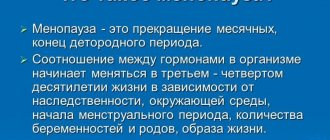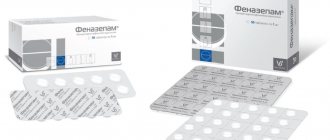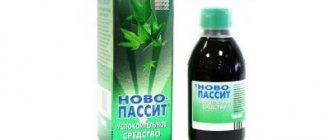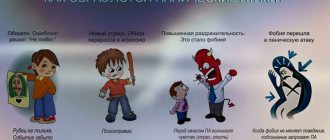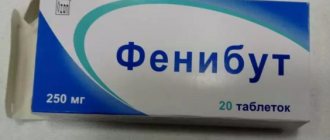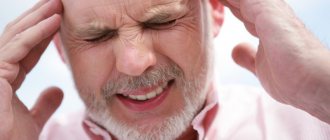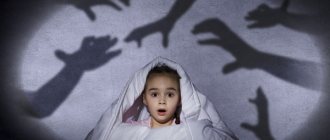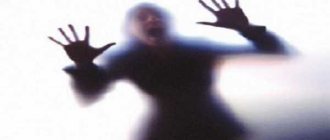| Place | Name | Characteristics in the rating |
| The best sedatives for panic attacks |
| 1 | Novo-passit | Best in combination with anxiolytics and antidepressants |
| 2 | Persen | The most natural composition |
| 3 | Valemidin | Combination of herbal ingredients and diphenhydramine |
| The best anxiolytics for panic attacks |
| 1 | Grandaxin | Minimum side effects. Does not cause drowsiness |
| 2 | Afobazole | The most recognizable drug |
| 3 | Atarax | Best for normalizing sleep |
| 4 | Phenazepam | Popular first generation tranquilizer |
| The best antidepressants for panic attacks |
| 1 | Escitalopram | Modern drug with high efficiency |
| 2 | Azafen | The most delicate action with a minimum of side effects |
| 3 | Amitriptyline | Best price |
Medicines for panic attacks are vital medications for a number of people. They help get rid of attacks of anxiety and fear, and relieve the physiological symptoms that develop against their background. You can buy drugs for panic attacks without a prescription only if they have a sedative effect and a mild effect. In order for the treatment of the disorder to be complete and competent, the choice of drugs must be made by a doctor, and their administration must be carried out under his supervision.
We have compiled a rating of the best drugs for panic attacks, including drugs with sedative effects, antidepressants and tranquilizers in the TOP. When evaluating the products, their compositions, popularity, as well as reviews from doctors and ordinary people were taken into account.
There are contraindications. Consult your doctor.
Panic attack: symptoms, causes and treatment
First, it’s worth understanding what a panic attack is.
It is an uncontrollable, explosive attack of intense anxiety and fear that has a range of psychological symptoms and cognitive-behavioural effects. Modern medicine gives different names to this disease: vegetative-vascular dystonia with a crisis course, sympathoadrenal crisis, vegetative crisis, cardioneurosis and neurocirculatory dystonia. Despite such a variety of names, the symptoms are always the same, and the cause is a disruption of the autonomic nervous system. A cure for panic attacks and phobias has been found, but the real causes have not. Until now, many scientists argue among themselves about what is the key reason. There is no clear answer to this question, but all experts agree that the root cause can be found in the family. If a child was raised in a family where one of the parents was too hot-tempered, harsh and aggressive, then there is a chance that in adulthood the person may show signs of anxiety. However, there is no such pattern; this is only a theoretical probability, which has been confirmed in practice by a number of cases.
As we know, many personality problems come from childhood. Fear attacks are no exception. In some cases, the disease can manifest itself just like that, under seemingly normal circumstances. In other cases, the impetus is a bright event that shocks a person. This can be either a good or a negative event (entering adulthood, starting a career, starting a family, having a child, the death of a loved one, a car accident).
Panic attack. What it is? Symptoms of a panic attack
A panic attack is a condition associated with the sudden release of a huge amount of adrenaline into the blood. Adrenaline is a stimulant and prepares the body for a physical response to danger (fight or flight). Hence the characteristic changes in the functioning of the heart and blood vessels, respiratory organs, heat exchange, and kidneys.
Characteristic symptoms of a panic attack:
- Increased heart rate;
- Feeling of fear;
- Lump in the chest, possible difficulty breathing;
- Violation of thermoregulation (feeling hot or cold);
- Vascular spasm (pallor or marbling of the skin, pulsation in the head, etc.);
- Shiver;
- Large amounts of urine may be leaked.
These symptoms themselves are a source of stress and can trigger a second and third wave of panic attacks. Therefore, we will teach you how to remove an attack when it appears. Panic attacks, for all their unpleasant symptoms, can be successfully treated.
Similar symptoms are possible with heart problems , which can be excluded using Holter monitoring, Echo-CG, ECG with stress.
A suppressed response to stress is the cause of panic attacks.
Panic attack: symptoms
What is a panic attack and in what situations does it occur? Life in the modern world is not easy, full of anxiety, negative events, and sudden changes. All this causes negative emotions: anxiety, fear, anticipation of impending disaster, danger. A person ceases to feel protected.
Medicines for panic attacks
We live in an age of maximum availability of various information, often frightening and unconfirmed. On the Internet, various dubious media, even from central television channels, news is constantly reported that causes fear among people. Constant tension, receiving negative information, the desire to be in the center of events so as not to miss anything “important” leads to exhaustion of the nervous system. At a certain moment, the human psyche refuses to work adequately under overstrain - a panic attack occurs. Symptoms:
- there is uncontrollable fear, lack of oxygen;
- the pulse quickens sharply, the heart begins to pound and flutter;
- feels hot, sweats, or feels chilly;
- nausea, dizziness, darkening of the eyes occur;
- hands shake slightly, or there is severe trembling;
- the sense of reality of what is happening disappears.
At risk are people prone to anxiety and constantly experiencing internal conflicts. Women who have recently given birth often experience attacks; workers who do not feel solid ground under their feet and are experiencing financial difficulties; individuals in a critical age period or genetically predisposed to such disorders.
It is very difficult to stop an attack and get rid of a negative mental reaction on your own. Therefore, to prevent or prevent an impending attack, doctors advise using pills for panic attacks.
Pills for panic attacks are divided into groups.
- Sedatives, sedatives. Usually sold without a prescription, they are good for minor illnesses. They do not depress the psyche, calm the emotional background, and have a beneficial effect on well-being.
- Beta blockers. Medicines that affect the functioning of the heart, promoting temporary blocking of beta-adrenergic receptors.
- Tranquilizers. They are of synthetic origin and are aimed at calming the psyche in cases of severe deviations from the normal state. They are taken only after medical consultation.
In addition, antipsychotics, nootropics, antidepressants, and homeopathic remedies are prescribed to treat panic attacks. Each group deserves separate consideration.
Mechanism of occurrence
Experts divide panic attacks into three main types:
- Spontaneous.
- Situational.
- Conditionally situational.
The first type of panic attack can occur at any time and for no apparent reason. The development of an attack in a situational type of attack is caused by a phobia or a certain situation - stress, overwork. The third type of panic attack occurs more often in people addicted to drugs, alcohol, and medications.
VSD and panic attacks require complex therapy aimed at eliminating symptomatic manifestations, as well as prevention, which will avoid VSD and panic attacks in the future. How to deal with panic attacks during VSD?
Sedatives or tranquilizers
Sedatives help at the onset of the disease. They are characterized by a low concentration of active substances, so they are freely dispensed. There are both completely natural origin (raw materials of mint, valerian, motherwort, passionflower, St. John's wort) and semi-synthetic (bromine). Effect of the course of treatment:
- the level of anxiety decreases, the person does not feel tormenting fear, and calms down;
- the quality and duration of sleep improves;
- the feeling of constant irritation goes away;
- the functioning of the cardiovascular system improves.
Such drugs are well known even to those who have not encountered manifestations of growing panic, but at least once needed a sedative: “Persen”, “Valocordin”, “Valerian”, “Validol”. The effect of the medications appears within 5-30 minutes from the moment of administration, so they are effective in combating panic reactions.
Beta blockers
Beta blockers have been known to medicine since the middle of the last century. They have proven themselves well in curing heart diseases. The main effect is blocking adrenergic receptors, which provoke a sharp release of adrenaline.
Modern pharmacology offers a wide selection of drugs in this group. They effectively combat the negative manifestations of overexertion, but are selected taking into account the age and physiological characteristics of a particular person. The most famous drug is “Anaprilin”.
Anaprilin
"Anaprilin" refers to non-selective beta-blockers, the active ingredient of which is propranolol. It is often prescribed on the first day after myocardial infarction. Basic actions:
- decrease in the intensity of work of the heart muscle;
- decrease in cardiac output;
- decreased ability of the myocardium to contract;
- normalization of blood pressure;
- reduction of the heart's sharp need for oxygen.
Many heart patients are familiar with this medicine and have taken it. But for panic attacks, the drug is prescribed with caution. Prescribing such treatment on your own is dangerous to your health!
Anaprilin
Mechanism of action of anaprilin
During a panic attack, there is a sharp release of adrenaline, so the heart begins to beat quickly, blood pressure increases, and breathing quickens.
Anaprilin is a beta-blocker that blocks the nerve endings that absorb adrenaline. Thus, adrenaline continues to be released, but the nervous system does not react to it. The pulse normalizes, the blood pressure returns to normal, and overexcitation is relieved. Therefore, anaprilin quite quickly stops a panic attack. In their reviews, doctors advise Anaprilin for VSD due to the main active ingredient, which is propranozole. Due to this, the drug functions as a continuous type of beta-blocker, since it blocks all beta-adrenergic receptors in the body. Nerve fibers that perceive adrenaline (epinephrine) are localized in synapses, that is, in places where nerves and organs connect.
Due to the supply of epinephrine to them, they begin to become excited and the synthesis of the hormone increases. An increase in its concentration usually leads to overexcitation of one of the subsystems (sympathetic) of the autonomic department and the person experiences panic. The basic production of adrenaline occurs mainly due to a stressful situation that has caused a feeling of fear in a person. Then a continuous chain begins, since the feeling of anxiety provokes the synthesis of epinephrine, because of which the patient begins to be even more afraid.
Most people who have used this drug talk about its positive effect on their general condition. After all, its mechanism of action helps stop the reaction and beta-adrenergic receptors temporarily stop accepting epinephrine. It follows from this that the adrenaline produced as a result of a stressful situation experienced does not affect the body, since all nerve fibers sensitive to it are blocked. Due to this effect, patients calm down, and the anxious feeling gradually disappears.
The main advantage, according to users, is its ability to block adrenaline without a sedative and psychotropic effect on the brain. Thanks to this, patients’ mental abilities and speed of thinking do not decrease. However, in their reviews, people who used Anaprilin described situations when adverse reactions from the nervous system suddenly arose. For this reason, it is advisable to refrain from work where concentration is important while taking the medication.
Scientists have created many drugs with selective effects. They serve to block certain beta-adrenergic receptors and have a prolonged (long-lasting) effect. This effect, according to experts, is not always useful, and during a panic attack it will not bring a positive result at all.
Anaprilin exerts its effect 20 minutes after oral use. If you believe the reviews, it is advisable to put the tablets under the tongue so that the effect is visible after 2-3 minutes. Duration of exposure is about 5 hours.
In their comments, the creators of the drug claim that it serves the following purposes:
- Normalization of heart rate;
- Blocking nerve impulses going to the heart muscle;
- Pressure stabilization;
- Normalization of oxygen consumption by the heart.
What happens in the body?
The mechanism for the development of an attack is as follows: sudden anxiety activates the adrenal glands, increasing the production of the stress hormone cortisol, which in turn causes a rapid heartbeat and has a vasoconstrictor effect. Constricted blood vessels increase the pressure of blood flow (increased blood pressure), spasms of smooth muscles begin, which explains sharp abdominal pain and involuntary urination. Tachycardia and increased muscle tone of the respiratory apparatus cause shortness of breath and a feeling of lack of air.
How does the disease progress? It must be said that either the patient himself or his relatives can notice something wrong. For outsiders, the situation may look completely different: your nerves have lost your nerves, someone has made you angry at work, simple imbalance. The thing about panic attacks is that you can never predict their occurrence.
Moreover, if there have already been attacks, then later they can occur without any regularity or reason, that is, like a bolt from the blue. It is surprising that an attack can occur even when a person is meditating or sleeping. Sometimes panic syndrome can be isolated. Then it is very difficult to diagnose it, but with knowledge of the matter, a person can understand what happened to him.
Most people experience multiple symptoms. In some cases, anxiety attacks still have their own periodicity. This applies to particularly impressionable and nervous people who experience nervousness when experiencing strong experiences. This could be being at a high altitude, public speaking, etc. In almost all cases, panic is caused by a situation in which a person feels helpless and unable to change anything.
During the periods between attacks, a person may look absolutely healthy and happy. Sometimes anxiety can be a symptom of another medical condition, such as phobia, depression and personality disorder. There is good news. Regardless of the cause of the attack, treatment is possible and effective. Today, there are a number of effective techniques that will help cope with the state of groundless fear.
Causes of panic attacks
VSD with panic attacks have a peculiarity - attacks are caused by both physical and psychological reasons:
- disturbed hormonal levels - hormonal imbalance is characteristic of the body of a teenager during puberty, women during menopause, and can be observed in pregnant women;
- pronounced phobias;
- chronic heart and vascular diseases, endocrine disorders, osteochondrosis and others;
- hereditary factor - rare, no more than 15% of cases;
- hangover syndrome.
Tranquilizers or anxiolytics
The second, less common name for tranquilizers is anxiolytics. They calm well in cases of strong, frequent panic reactions. They have a number of positive effects.
| Therapeutic effect | Description |
| Anxiolytic | A noticeable decrease in feelings of anxiety and fear, bringing relief to those suffering from a panic attack. |
| Anticonvulsant | Preventing the occurrence of convulsive reactions and neuralgia. |
| Sedative | Calming, creating a sense of security. |
| Hypnotic | Normalization of sleep quality, relief from insomnia. |
| Antiphobic | Helping combat feelings of obsessive fear. |
| Muscle relaxant | Decreased muscle tone, muscle relaxation. |
| Vegetostabilizing | Stabilization of the state of the vegetative-vascular system. |
In pharmacology, such drugs are divided into several groups, the basis of the classification is the active substance. However, it is important to understand: no matter what drug the doctor prescribes, almost all tranquilizers are quickly addictive. As a result, the body begins to demand medicine, but in fact it no longer helps. That is why it is recommended to resort to the help of anxiolytics in rare cases, and also, if possible, to use drugs from different groups.
Tranquilizers in which the active component is a benzodiazepine, which reduces the excitability of the central nervous system due to the direct effect on neuronal gamma-aminobutyric acid (GABA) receptors. They have a good hypnotic effect, but, unfortunately, they are addictive.
Amizil, Atarax
The main active ingredient is diphenylmethane. Such drugs are called “mild” tranquilizers that do not cause severe harm to health. By using medications from this group, a person experiences noticeable relief within fifteen to a maximum of thirty minutes.
The listed medicines are based on various chemical derivatives. Usually prescribed for neurasthenic conditions, withdrawal symptoms, and constant feelings of anxiety.
You can purchase a tranquilizer with a prescription prescribed by a doctor. The course of use is short, since long-term use causes addiction. Please note: every anxiolytic, even the latest generation, has serious contraindications.
What could be the consequences?
Panic attacks, the causes and treatment of which we discuss, can have serious consequences, so it is very important to consult a doctor in time to begin treatment. The consequences can be quite significant:
- hyperthyroidism;
- hypoglycemia;
- disturbances in the functioning of the body;
- mitral valve prolapse.
It is worth understanding that improper treatment can also be disastrous, which is why it is so important to choose a trusted specialist. Alternatively, the patient may need strong stimulation of the brain through narcotic substances; side effects of some potent drugs are possible.
If you ignore panic attacks, they can significantly ruin your life. Cognitive abilities are negatively affected, they decrease, and their quality suffers. Adaptive capabilities are declining. A person becomes irritable, unable to concentrate on work, or manage his emotional state even in serious situations.
Therefore, there is no need to delay treatment. You need to contact an experienced specialist who will prescribe complex therapy. It is impossible to do without medication, since a panic attack affects the nervous and endocrine systems. And additional help from a psychotherapist will speed up recovery.
Neuroleptics
Neuroleptics are drugs that alleviate the condition of deep mental lesions. Their second name is antipsychotics. Such medications are prescribed in particularly serious cases and only by doctors.
First generation psychotropic drugs include Galaperidol and Amenazine. Most often used for drug addiction or psychiatric problems.
Minor antipsychotics (Truxal, Sonapax, Betamax) are second-generation medicinal compounds. Treat neurotic pathologies: deep depression, panic attacks. Dispensed by prescription.
Antidepressants
Most people confuse this group of drugs with tranquilizers. However, there is a significant difference: such drugs act directly on the neurons of the brain, helping to restore its normal activity. Most often they are used to treat depressive conditions, which, unlike panic attacks, are protracted.
Pharmacology has developed fourth-generation antidepressants: Remeron, Cymbalta, Zyban. They have fewer side effects than earlier analogues, plus they act faster. However, the first and second generation are more popular: Fluoxetine, Imipramine, Amitriptyline. The situation is due to the higher cost of new drugs and less popularity.
Antidepressants are used not for treatment, but to relieve symptoms, that is, to quickly relieve them. This allows a person to quickly get rid of a panic attack and come to his senses. It is worth noting that antidepressants for panic attacks are used only in the most severe cases, when there is no other way out. However, they do not relieve a person from the main cause of attacks, which lies in a psychological disorder.
Panic attacks. Treatment. Routine, nutrition, physical activity
Regime, nutrition and physical activity during panic attacks do not significantly affect the causes of the disease. Still, following these recommendations will help you soften the course and reduce the frequency of panic attacks:
- Get as much sleep as possible;
- Eat food 3-4 times a day, preferably at the same time;
- Take walks in nature and in general, allow yourself simple “pleasures”;
- Load yourself with physical exercise;
- Reduce your intake of stimulants (coffee, large doses of B vitamins, energy drinks, alcohol);
- Avoid watching programs and films with scenes of violence.
Homeopathy
Homeopathic recipes are also used for mental disorders. However, such pills for panic attacks are considered dubious by some doctors. Although, they have a number of advantages over traditional drugs:
- absolutely safe when taken correctly;
- most have no serious contraindications;
- have a gentle effect on the nervous system;
- normalize the functioning of the entire body.
Well-known names of drugs whose prescription contains only one active ingredient (monoprugs).
| Name | When is it appointed? | Active ingredient |
| Ignacy | With a tendency to hysterics, as well as sharp, severe, violent panic attacks. | An extract from the seeds of Ignatia, a climbing shrub found throughout the Philippines. |
| Aconite | Significantly reduces the manifestations of melancholy, stops attacks of a frightening feeling of lack of air. Relieves fears. | Aconite (fighter) is a buttercup plant, which is entirely a raw material for the preparation of homeopathic remedies. |
| Pulsatilla | Helps people who are prone to tearfulness, who experience a feeling of complete nervous exhaustion, who are losing or have already lost interest in life. | The raw materials for preparing the drug are meadow lumbago, dream grass, snowdrop. Used whole, collected in May while it blooms. |
| Platinum | Prescribed to people suffering from obsessions related to the sexual sphere. Helps get rid of haunting fears. | Platinum metal is a well-known component of many homeopathic compositions. |
Tenoten is considered one of the medicines related to homeopathy.
Tenoten
The manufacturer, LLC NPF Materia Medica Holding, recommends the drug in cases of anxiety, to combat stressful conditions. The effectiveness of Tenoten in the treatment of pathological mental conditions has not been officially proven; many experts classify it as a placebo.
Tenoten
Reviews about the treatment
Drug treatment of panic attacks, reviews of which we will consider below, is effective only under certain conditions. Firstly, a person must strictly follow the doctor’s instructions. Very often, people listen to their relatives and stop taking medications, and then complain that the doctor never helped them and the medications are useless.
This cannot be done, because when you interrupt the medication, the body gets stressed, which only aggravates the situation. Secondly, many agree to take psychotropic substances, but then abruptly decide to trust traditional medicine. People do not understand that natural sedatives (melissa, valerian) have an insufficient sedative effect; they are not able to cope with a panic attack. In the end, again, in their opinion, the doctor is to blame.
People who strictly follow the doctor’s instructions and undergo pharmacological and psychotherapeutic treatment always get rid of panic attacks. The main thing here is perseverance and consistency, otherwise there will be no effect. Negative reviews about drug treatment often refer to low-quality drugs, but this is a mistake.
Outpatient and inpatient treatment
The Mental Health Clinic successfully combines the treatment of panic attacks both with medication and through psychotherapy. Most often, treatment for panic attacks is carried out on an outpatient basis, but there are also options for inpatient placement. The attending physician will select an antidepressant that will help relieve acute symptoms and draw up a treatment plan, including the prevention and relief of possible recurrences of panic attacks. Patients who clearly know how to help themselves when the disease manifests itself experience significantly less fear of the manifestation of a crisis, which reduces general anxiety and raises the emotional background in general. However, the most important psychiatric help for panic attacks is to conduct active psychotherapeutic work with the patient. This will allow you to find the root cause of the disease and, by completely eliminating it, get rid of the disease forever.
We can help you! Call us
The best pills: list with detailed explanation
It is difficult to compile an objective list of the best pills for panic attacks: for each person the drug is selected individually, taking into account a number of factors. The prescription of a medicine is influenced by the patient’s physical and mental state, the presence of chronic, acute or allergic diseases, body weight and much more.
An approximate list of drugs often prescribed by doctors.
- "Atarax." The active component is dimethylethane derivatives. Relieves the symptoms of a panic attack, calms, relieves stress, relieves pain. When taken, memory is not impaired, but drowsiness increases. Doctors recommend consuming it immediately before bed: the quality of night's rest will improve.
- "Afobazole". Normalizes the functioning of the central nervous system without depressing it, relaxes, improves the condition, and relieves anxiety. Does not reduce physical activity, which makes it different from other analogues. It does not lead to drowsiness, so taking it does not affect human activity in any way. Allergic reactions are extremely rare.
- "Gidazepam." In addition to relieving symptoms of panic, it acts as an antidepressant. Non-toxic and has no significant side effects. The effect of Gidazepam manifests itself quickly and activity increases. However, the medicine is highly addictive and distracts attention, so it is prohibited to use it if a person plans, for example, to drive.
- "Grandaxin". The action is similar to Atarax, but does not cause drowsiness. The dose is prescribed during the day: the drug stimulates physical and mental activity and does not affect normal daily activities. The therapeutic effect develops quickly: after two hours from the moment of use.
- "Phenazepam." Relieves anxiety, eliminates manifestations of convulsive activity. It is often prescribed as a means of eliminating insomnia. Quickly relieves symptoms of panic.
Treatment with medications
Drug treatment is aimed at relieving acute symptoms of the disease and normalizing the functioning of the nervous system. The use of sedatives and antidepressants is indicated in cases where the patient cannot cope with panic attacks on his own or when the manifestations of the disease are too dangerous for the person himself and others.
All medications used to treat panic attacks, except herbal ones, are quite dangerous drugs that have many contraindications and side effects and should be used only as directed and under the supervision of a neurologist or psychiatrist.
The most commonly used treatments for panic attacks are:
- sedatives;
- antidepressants;
- neuroleptics;
- auxiliary drugs.
Sedatives
Calming or sedative drugs are considered the easiest means for treating various diseases accompanied by feelings of anxiety and fear. They have a gentle effect on the nervous system, reducing negative experiences.
The most popular are herbal preparations; they are safe, do not cause addiction or side effects. But to achieve a pronounced clinical effect, long-term use of these drugs is necessary, at least 3-4 weeks of regular treatment. Also, to treat attacks, combined and synthesized drugs are used, which are more powerful.
The following sedatives are used for treatment:
- Tinctures of valerian, motherwort, peony - 15-30 drops 2-3 times a day, for 30-40 days.
- Valerian, motherwort in tablets - 1-2 tablets 2-3 times a day for 30-60 days.
- Combined drugs: Corvalol, Valocardin, Valordin, Nervoflux, Novo-Passit and so on - take 10-20 drops 3 times a day, for 20-30 days.
- Synthesized drugs - bromine salts: sodium bromide, potassium bromide and barbiturates: phenobarbital, bellaspon and others. These drugs have a pronounced sedative effect, have a toxic effect on the body, can be addictive and should be used only as directed and under the supervision of a physician.
Antidepressants
The most popular drugs in the treatment of psychopathic diseases. Antidepressants increase the content of neurotransmitters in the brain, thereby activating and normalizing the functioning of the nervous system. Taking antidepressants helps cope with increased anxiety, fears, apathy, decreased mood and other similar symptoms.
Antidepressants are synthetic drugs that are not addictive and have minimal side effects on the body, but to achieve a clinical effect also requires at least 2-3 weeks of regular use.
There are 4 generations of antidepressants, and, until now, despite the pronounced side effects, drugs of the 1st and 2nd generation are popular, since it is their effect on the human body that has been studied as fully as possible, and they are the most accessible.
3rd-4th generation drugs have a milder effect, have a minimum of side effects, but are less studied and are much more expensive.
To treat attacks, the following are most often used:
- Azafen - improves mood and has a sedative effect on the nervous system. Effective for mild depression and mild panic attacks. Start taking azafen with small doses as prescribed by the doctor, gradually increasing the dose; If the drug is well tolerated, this dose continues to be taken for 4-6 weeks.
- Amitriptyline has a pronounced sedative and thymolytic (mood-improving) effect, belongs to the first generation drugs, and has a pronounced clinical effect when used to treat attacks. Start taking the dose prescribed by the doctor, gradually increasing it until a clinical effect is achieved, the drug is taken for 6-8 weeks, then gradually reducing the dose.
- Fluoroacyzine – has a strong sedative and thymolytic effect, reduces the excitability of the nervous system and relieves psychopathological symptoms. This drug can be used for severe symptoms of panic attacks.
- Pyrazidol is a highly effective antidepressant recommended for use for all types of depression. Relieves nervous excitement, fear, anxiety; during panic attacks, it is recommended for use only with severe symptoms of panic and anxiety. Take in doses prescribed by your doctor, increasing the dose to the desired value, for 6-8 weeks.
- Fluoxetine is a new antidepressant drug that has a milder effect and is indicated for use in panic attacks accompanied by severe fear and anxiety. Take at the beginning of treatment in small dosages, gradually increasing the dose. The drug is well tolerated and recommended for use in all groups of patients suffering from panic attacks. The course of treatment is 6-8 weeks.
Neuroleptics
Neuroleptics are psychotropic drugs, the use of which is justified only in the case of severe psychopathic symptoms in the patient or panic attacks that are not controlled by other medications. Neuroleptics inhibit any psychopathological activity of the brain, but at the same time they have a pronounced systemic effect on the entire body, disrupting the normal functioning of the brain, so they can only be taken as prescribed and under the strict supervision of a doctor. To treat attacks, so-called “mild neuroleptics” are usually used: etaprazine, propazine, sonapax.
Ancillary drugs
To treat and prevent panic attacks, additionally take nootropics - drugs that improve cerebral circulation; vitamins and microelements - for general strengthening of the body.
Hypnosis
Treatment of panic attacks with hypnosis is a method used in the initial stages of the disease. When anxiety reaches its limit, it is too late to turn to hypnosis. Many patients go to extremes: some do not believe in the effectiveness of the method, and some believe that a hypnotherapy session will save them from all their troubles once and for all.
Both of them are wrong. Hypnosis allows you to tune the psyche to work properly, and this, in turn, reduces the likelihood of a panic attack. The effectiveness of the method depends on a number of factors. The professionalism of the psychotherapist comes first, so you need to choose him very carefully, and not trust yourself to the first circus hypnotist you come across.
The second factor is personal predisposition to trance. Some people are very easily influenced by external influences; they have increased suggestibility. For such people, hypnosis treatment will be more effective. In order to increase your suggestibility, you should stop controlling everyone and everything. Yes, it is very difficult to let go of a situation when an anxiety attack can overtake you at any moment, but this must be done to get the effect of treatment.
List of medications
[AdSens-B]
Phenazepam
Phenazepam belongs to the group of tranquilizers. Has anti-anxiety and sedative effects. Causes relaxation of the muscles of the whole body, has a hypnotic effect.
Directions for use: tablets (0.25-0.5 mg) 2-3 per day.
Side effects: drowsiness, dizziness, impaired coordination of movement.
Contraindications: severe myasthenia gravis, kidney or liver disease, pregnancy.
Afobazole
Afobazole is a tranquilizer, anxiolytic. At the same time, it has an anti-anxiety and stimulating effect on the psyche.
Reduces the level of subjective experiences: irritability from minor external factors, apprehension, anxiety, bad feeling, causeless anxiety.
The drug relieves symptoms of nervous system weakness: tension, emotional lability, tearfulness, poor sleep. Normalization of the state of vegetative systems from the psychogenic influence on them. I often attribute it to people with an asthenic personality type.
Directions for use in patients with panic attacks: tablets (10 mg) 3 times a day. If necessary, the dose is increased in accordance with the doctor's recommendation.
Side effects of the drug: gastrointestinal disorders, allergies.
Contraindications: hypolactasia, pregnancy, children under 18 years of age.
Atarax
Atarax is part of the group of tranquilizers and histamine blockers. Reduces muscle tone, promotes deep natural sleep with normal phase changes. It is a sedative, so it has a calming effect during panic attacks. Used before surgery to relieve anxiety.
Directions for use: tablets (0.05-0.3 g) per day.
Side effects of the drug: hypersensitivity, blurred vision, nausea, increased heart rate.
Contraindications: galactose and lactose intolerance, porphyria.
Glycine
Glycine is a nootropic, essential amino acid, muscle relaxant. Reduces psycho-emotional stress, promotes the activation of protective inhibition of the central nervous system, increases the level of adaptation in society, normalizes mood stability, and improves sleep quality.
Directions for use: tablet (0.1 g) 2-3 times a day, under the tongue or behind the cheek.
Side effects of the drug: allergies (rare).
Contraindications: hypersensitivity, hypotension, children under 2 years of age.
Anaprilin
Anaprilin is a representative of β-blockers. It affects receptors in the heart, therefore reducing the frequency and strength of contractions, and pressure indicators.
During panic attacks, it fights the vegetative manifestation – tachycardia. Used to prevent migraines. Quickly absorbed into the body.
Directions for use: tablets (0.01 g) per day.
Side effects: abdominal pain, bradycardia, nausea, cough, baldness.
Contraindications: bradycardia, sinoatrial block, bronchial asthma, ketoacidosis.
Gidazepam is a tranquilizer. Reduces the level of anxiety, fear, normalizes emotional state and sleep. Relieves irritability and tension.
Directions for use: tablets (0.02-0.05 g) per day.
Side effects: delayed reaction to external factors, drowsiness, impaired attention, allergies, decreased libido.
Contraindications: kidney disease, glaucoma, myasthenia gravis, pregnancy.
Grandaxin
Grandaxin is a tranquilizer. Has a standard set of actions characteristic of the group. Distinctive features: does not cause drowsiness, does not relax muscles. A good remedy for panic attacks.
Directions for use: tablets (0.05-0.1 g) 1-3 per day.
Side effects: dyspepsia, rash, severe mental excitability in case of overdose.
Contraindications: withdrawal syndrome, manic states, pregnancy during the first 3 months.
Phenibut
Phenibut is a tranquilizer. Reduces anxiety and panic, balances the human condition.
Directions for use: tablets (0.25-0.5 g) per day.
Side effects: drowsiness.
Contraindications: do not use when performing work that requires a high level of attention.
Corvalol
Corvalol is a sedative. Relieves tachycardia, spasms of the heart vessels, insomnia, and mild hypertension. Normalizes mental state during irritability.
Directions for use: 30-40 drops for a panic attack.
Side effects of the drug: drowsiness.
Valerian
Valerian is a representative of the sedative group of drugs. Depresses the nervous system, relieves mild tachycardia and insomnia. Used in the treatment of panic attacks.
Directions for use: 30-40 drops, 2-3 tablets per day. For PA, 2-4 tablets in one dose.
Side effects: inhibition of reactions, stool disturbance.
Contraindications: lactase deficiency, fructose intolerance.
Teraligen
Teraligen is an antipsychotic, antispasmodic. Has antipsychotic and sedative effects. Used for psychoasthenic disorders. It is quickly absorbed and begins to act on the body within 1-2 hours.
Directions for use: tablets (0.2 g) 3-4 times a day.
Side effects: very rare - asthenia, confusion, tinnitus, dry mucous membranes, urinary retention.
Contraindications for the drug: lactase deficiency, parkinsonism, glaucoma, kidney and liver disease.
Valocordin
Valocordin is a sedative. Helps with insomnia, neurotic conditions, tachycardia.
Directions for use: 15-25 drops before meals for PA and palpitations.
Side effects: addiction, withdrawal syndrome.
Contraindications: porphyria, kidney disease.
Validol
Validol is a representative of sedative drugs. Has a calming effect in cases of affect, anxiety, and emotional instability.
Directions for use: tablets (0.06 g) under the tongue or 4-5 drops per spoon with sugar during PA.
Side effects: very rarely - dizziness, nausea.
Contraindications for the medication: none.
Persen
Persen is a sedative drug that contains herbal components. Relieves psycho-emotional agitation and insomnia. Practiced by psychotherapists in the treatment of panic attacks.
Directions for use: tablets (0.1 g) 2-3 times a day.
Side effects: constipation with long-term use.
Contraindications: children under 3 years of age.
My experience of taking Anaprilin for panic attacks
You should use anaprilin only if you feel the onset of a panic attack. You shouldn’t drink anaprilin all the time, because you quickly become addicted to it, so if you don’t have a panic attack, then you don’t need to drink anaprilin.
To reduce side effects on the gastrointestinal tract, it is better not to take anaprilin tablets, but to dissolve them in the mouth under the tongue. You need to chew the tablet a little and hold it in your mouth. The drug should take effect within 5 minutes, then the tablet can be spat out. The effect of the drug can be understood by reducing heart rate and agitation.
If you need a longer effect, for example, during a trip or flight, take 1 tablet of anaprilin orally with plenty of water. The action will begin in 15-20 minutes and last up to 5-6 hours.
Anaprilin lowers blood pressure and heart rate, so it cannot be used if the pulse is below 60 beats. In general, if your standard blood pressure is low or your pulse is low, then you should be very careful about taking anaprilin. Of course, during a panic attack there is no low pulse, but in some people anxiety attacks manifest themselves in a hypotonic type, i.e. with a general decrease in body tone, with a decrease in blood pressure, it is better for such people to refrain from taking anaprilin.
Also contraindicated are heart failure and problems with the bronchi, for example, bronchitis or bronchial asthma. With caution if you have diabetes, because... anaprilin lowers blood sugar. Often, when taking anaprilin, the concentration decreases and the reaction slows down, which must be taken into account when driving a car.
According to the instructions, the indications for taking Anaprilin are:
- heart rhythm disturbances caused by rheumatic heart lesions (arrhythmia, tachyarrhythmia, sinus and paroxysmal tachycardia);
- angina pectoris;
- cardiac ischemia;
- hypertension;
- poisoning with cardiac glycosides, namely digitalis preparations;
- thyrotoxicosis (as an additional treatment);
- pheochromocytoma (prescribed in combination with α-blockers).
Anaprilin is also recommended for prophylactic long-term treatment after myocardial infarction and for the prevention of migraine.
That is, as we see, tachycardia is a direct indication for taking Anaprilin. But it also has many side effects.
The most obvious of them:
- Reduced blood pressure.
- Bradycardia (low heart rate).
- Low blood sugar.
- Dizziness.
- Decreased mood.
- Slowing down the speed of reactions.
- Allergic manifestations.
I’ll say right away that my doctor prescribed the medicine to me. Previously, I did not even suspect the existence of such medications and had never encountered them.
I am hypotensive and my working pressure is 100/70. In hot weather it can be even lower – 90/60. At the same time, I feel good. Even during panic attacks, my blood pressure did not rise above 110/80. The maximum heart rate that I was able to record during attacks was 130 beats per minute.
With such indicators, I was prescribed 1/4 tablet of Anaprilin 0.04 g. That is, only 0.01 g. And I took even this minimum dosage with caution. Why? Because Anaprilin lowers blood pressure. Not much, but it lowers it. If after a quarter of a pill it could drop from 100/70 to 90/60, then I shudder to think what would have happened if I had taken a whole pill.
This is why I want to warn everyone - do not prescribe Anaprilin for VSD yourself. This should be done by a doctor after studying all your tests.
I was prescribed to drink it in the morning shortly before meals. First, 10 days in a row, then as needed (during attacks of PA).
How did I feel after taking the medicine?
The action of Anaprilin begins in approximately 15-20 minutes. The pulse actually drops, and the nervous system calms down. Every time I took the pill I felt good. The medication has always helped stop PA.
Its effect lasts quite a long time – up to 6 hours.
I did not get carried away with this medicine and did not take it for so long. Gradually, I completely abandoned it. But Anaprilin is still in my medicine cabinet as a means of quick and effective action. After all, heart problems can happen not only against the background of VSD. Therefore, I think such a drug will not be superfluous in the house.
I heard that you can put a tablet under your tongue and, without swallowing saliva, spit it out after a few minutes. So, you can calm down minor anxiety and minor tachycardia without fear of overdose.
But personally, I have never done that. I think before taking medicine in this way, you should consult your doctor.
How and in what dosage to take Anaprilin during a panic attack - only your doctor can decide!
Do not prescribe such medications for yourself based on advice on the Internet. This is extremely unwise.
As you probably understand, Anaprilin is far from safe. In addition, people with VSD very rarely have any serious organic pathologies, and it seems to me that it is not worth taking such a serious drug just because you are scared and anxious. But I’m not a doctor, I’m just sharing my opinion regarding beta-blockers for vegetative-vascular dystonia.
What can happen to a relatively healthy organism of a person with VSD when taking Anaprilin uncontrolled?
- Psychological addiction will occur. The fact of having to stop taking the medication that worked so well for panic attacks will cause new PAs.
- Development of hypotension. If you take Anaprilin uncontrollably, a person with normal blood pressure runs the risk of developing hypotension (sustained low blood pressure) in their body. But what's even worse is that an overdose can lead to fainting and a very slow heartbeat. And this is no longer a joke.
- Exposing the body to constant stress. By taking Anaprilin during panic attacks, the VSD person forces his body to experience stress every time. When the nerve endings turn off, the brain thinks that the body has broken down. First, he begins to produce increasingly large portions of adrenaline, in the hope that the receptors will react to it. Then, when nothing happens, it gives the body a command to build new adrenergic receptors. But this is not an easy job.
It is quite clear that thoughtless, uncontrolled interference in such a complex work of the body is unsafe.
So is it worth taking Anaprilin for VSD and panic attacks? Yes, but only as prescribed by a doctor, in strictly specified dosages and no more than the recommended period. All these factors are determined by the doctor individually.
There are situations in which the use of this medicine is contraindicated:
- Bronchial asthma.
- Hypotension (low blood pressure).
- Diabetes.
- Pregnancy.
- Low heart rate.
- Heart failure.
- Raynaud's disease (acute vascular spasms).
- VSD of hypotonic type.
- Drinking alcohol.
- Taking tranquilizers, neuroleptics and antidepressants.
- Cold with elevated body temperature.
An overdose of the drug negatively affects the condition of the body. After taking an excessive amount of medication, side effects may occur in various organ systems.
Heart:
- Bradycardia (decrease in heart rate to 60 beats per minute).
- Hypotension (severe decrease in blood pressure).
- Progression of heart failure.
Central nervous system:
- Asthenia (weakness).
- Dizziness.
- Insomnia.
- Drowsiness.
Gastrointestinal tract:
- Nausea.
- Vomit.
- Diarrhea.
- Constipation.
If you notice such a reaction in the body after taking the medicine, you should immediately contact the doctor who prescribed this drug. The specialist must adjust the treatment regimen or cancel Anaprilin and prescribe another medication to relieve panic attacks and eliminate side effects.
The drug showed the best effect in the treatment of the following pathological conditions:
- Accelerated heart rate;
- Ischemia of the heart muscle (insufficient blood supply);
- Hypertension (high blood pressure);
- Vegetovascular dystonia;
- Panic attacks;
- Diseases characterized by increased synthesis of adrenaline;
- Migraine.
Experts advise not to use the medication in the following situations:
- Heart failure. Such contraindications are one of the most dangerous and can lead to death due to pulmonary edema or cardiac arrest;
- Bronchial asthma. The medicine can provoke spasms in the bronchi, which will significantly worsen the course of the disease;
- Heart rate does not exceed 50 beats per minute;
- Diabetes. Anaprilin can lead to hypoglycemic coma, so it is strictly contraindicated for diabetics;
- Hypotension (low blood pressure);
- Weakness of the sinus node;
- Raynaud's disease (acute vasospasm). The forums described cases where Anaprilin aggravated the condition of patients in whom distant vessels were in a state of spasm;
- Work that requires concentration. The drug does not have a depressant effect on the nervous system, but it is characterized by side effects. They are the ones who influence concentration;
- Pregnancy. Reviews were left on the Internet that the drug can cause miscarriage and affects the reproductive system, so it is strictly contraindicated during this period.
Before using Anaprilin, you should remember the manufacturer's main warning. Its essence is that the drug cannot be taken for vegetative-vascular dystonia of the hypotonic type. In such a situation, after consuming Anaprilin, the symptoms of the disease will only worsen.
Most users write in their comments that the drug does not need to be taken constantly in large volumes. It is usually used after a detailed diagnosis, which is performed to exclude other pathological processes and find the cause of VSD and panic attacks. If no diseases are detected, then the body itself can cope with stressful situations and only needs a little help with a minimal dose of Anaprilin.
People who neglect this rule and drink the medication in large quantities develop an addiction to it over time. When using the drug above the recommended norms, the production of adrenaline increases in patients, as the body tries to overcome the created blockade. With age, this phenomenon can lead to hypertension and aggravation of the symptoms characteristic of VSD.

